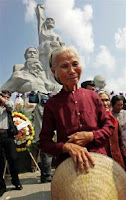 from monsters & critics: The soldiers of the 1st Battalion, 11th US Army Brigade, arrived in the morning. Their mission was clear. "The orders were to shoot anything that moved," one US army officer told journalist Seymour Hersh, the investigative journalist who broke the story in 1969.
from monsters & critics: The soldiers of the 1st Battalion, 11th US Army Brigade, arrived in the morning. Their mission was clear. "The orders were to shoot anything that moved," one US army officer told journalist Seymour Hersh, the investigative journalist who broke the story in 1969.As the brigade pulled out three hours later on that fateful day, March 16, 1968, the village of My Lai in south Vietnam's highlands was levelled. Not a living thing stirred. Blood-soaked bodies covered the ground - women, children, old men, dogs. Smoke from burning huts could be seen from afar. The bodies of young women bore evidence of sexual violation.
The number of dead ranged from 347 to 504, victims of a Charlie Company gone amok in blood lust. Not one shot had been fired at the infantry. It would be another year and a half before the American public learned the truth - after a cover-up by the US Army...
 Last summer, historians were outraged by US President George W Bush's comparison of Vietnam to Iraq. Bush likened the dangers of withdrawing from Iraq to the 'killing fields' that followed the US withdrawal from Vietnam. The 2008 release of Pinkville, a new film about My Lai by director Oliver Stone - Platoon (1986) and Born on the Fourth of July (1989) - will no doubt bring up more comparisons to current US military actions.
Last summer, historians were outraged by US President George W Bush's comparison of Vietnam to Iraq. Bush likened the dangers of withdrawing from Iraq to the 'killing fields' that followed the US withdrawal from Vietnam. The 2008 release of Pinkville, a new film about My Lai by director Oliver Stone - Platoon (1986) and Born on the Fourth of July (1989) - will no doubt bring up more comparisons to current US military actions.

No comments:
Post a Comment